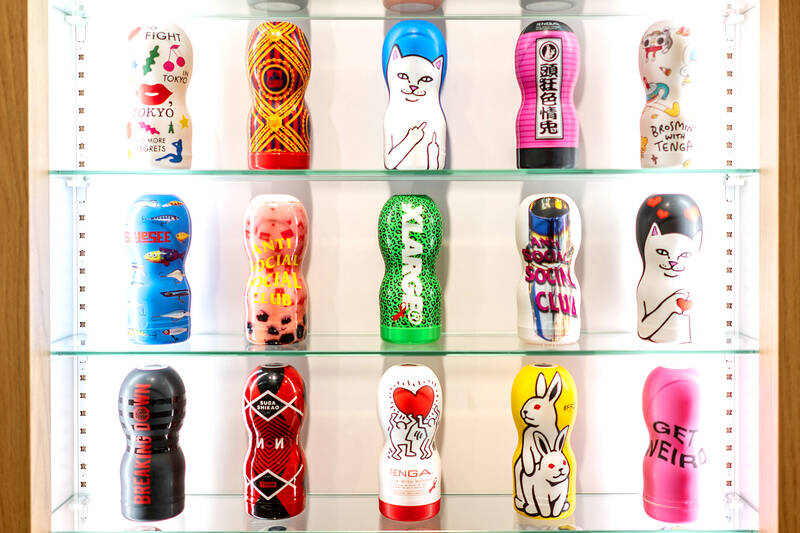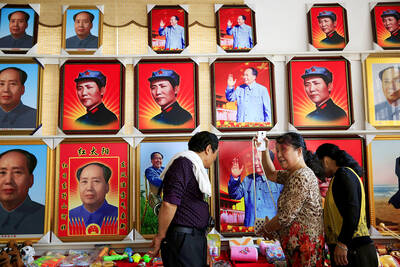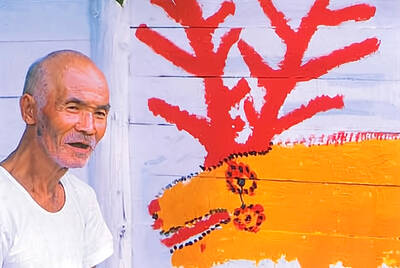Hourglass-shaped sex toys casually glide along a conveyor belt through an airy new store in Tokyo, the latest attempt by Japanese manufacturer Tenga to sell adult products without the shame that is often attached.
At first glance it’s not even obvious that the sleek, colorful products on display are Japan’s favorite sex toys for men, but the store has drawn a stream of couples and tourists since opening this year.
“Its openness surprised me,” said customer Masafumi Kawasaki, 45, “and made me a bit embarrassed that I’d had a ‘naughty’ image” of the company. I might have thought this was some kind of cosmetics shop,” he added.

Photo: AFP
Although best known for single-use male masturbation aids, known as cups, the Japanese Tenga brand has grown into an intimacy empire, offering toys for men and women, as well as family planning and help for people with sexual disorders.
It is a key player in Japan’s adult goods market that Yano Research Institute in 2016 estimated was worth around 209 billion yen (US$1.3 billion).
Tenga items are sold in dozens of countries, and nearly half the firm’s annual sales of 10 billion yen — a figure that has doubled over the past six years — are from overseas.
Founder Koichi Matsumoto, 57, said that he has long strived to de-stigmatize sexual pleasure.
Sex toys for men existed before Tenga, but their crude designs replicating genitalia kept them underground, far from the mainstream image that his firm projects.
Matsumoto recalled seeing such goods hidden in store corners, their packaging decorated with porn actresses and in some cases, cartoons of young girls.
“Those products seemed to say, ‘please use us to feel lewd and obscene, because that’s what masturbation is,’” he said.
“I found that message debasing and wrong — because it’s a fundamental, important human desire.”
‘LONELY, SINGLE MEN’
Inspired to create something more “positive, friendly and safe,” Matsumoto quit his job as a car salesman and embarked on a mission to bring the industry from the “back alleys into high streets.”
Tenga products are designed to look different from explicit artificial vaginas and vulvas which Matsumoto says objectify women.
The company’s marketing team describes its wares — including the signature bright phallic cups, vibrators and other toys — as “artistic.”
But prejudices remain around the firm, despite creative collaborations for products such as hipster T-shirts.
Tenga cups are still often misconstrued as catering to “lonely, single men seeking a replacement for women,” said Mei Kamiya, a 26-year-old clerk at the new Tenga Land flagship store in Tokyo’s trendy Harajuku district.
But masturbation is “normal for everyone,” while other Tenga products, such as vibrators, can deepen intimacy between partners, she said.
Japan, like many developed nations, is struggling with a low birth rate, which is fueling a looming demographic crisis.
But Matsumoto rejects the suggestion that Tenga products promote sexlessness.
“If anything, I think we’re doing the opposite of encouraging birth rates to fall” in Japan, he said.
‘LESS TABOO’
Tenga sells sperm monitoring kits for couples hoping to conceive, and tools for those suffering from erectile dysfunction.
Some doctors recommend its healthcare products as “one option” to treat sexual disorders, said Mikiya Nakatsuka, a professor of reproductive medicine at Okayama University.
But there is a tendency in Japan to shy away from sex-related topics, including menstruation and contraception, partly due to conservative school sex education, he said.
“Are we going to see midday TV commercials about Tenga any time soon? I don’t think so,” Nakatsuka said.
Even so, Tenga’s “stylishness and its medical usefulness can help make these types of conversations less taboo.”
Going forward, Tenga wants to target the country’s aging population, whose needs it says are often overlooked.
Some elderly people feel they are “automatically assumed to be too old to even have sexual desires,” the firm’s research found.
Others live with and are financially dependent on adult children, giving them little privacy.
For women in older generations, “there was a time when it was considered shameful or unladylike for them to be open or assertive about sex,” Matsumoto said.
“We tell them it is a good, healthy thing.”

Taiwan can often feel woefully behind on global trends, from fashion to food, and influences can sometimes feel like the last on the metaphorical bandwagon. In the West, suddenly every burger is being smashed and honey has become “hot” and we’re all drinking orange wine. But it took a good while for a smash burger in Taipei to come across my radar. For the uninitiated, a smash burger is, well, a normal burger patty but smashed flat. Originally, I didn’t understand. Surely the best part of a burger is the thick patty with all the juiciness of the beef, the

The ultimate goal of the Chinese Communist Party (CCP) is the total and overwhelming domination of everything within the sphere of what it considers China and deems as theirs. All decision-making by the CCP must be understood through that lens. Any decision made is to entrench — or ideally expand that power. They are fiercely hostile to anything that weakens or compromises their control of “China.” By design, they will stop at nothing to ensure that there is no distinction between the CCP and the Chinese nation, people, culture, civilization, religion, economy, property, military or government — they are all subsidiary

This year’s Miss Universe in Thailand has been marred by ugly drama, with allegations of an insult to a beauty queen’s intellect, a walkout by pageant contestants and a tearful tantrum by the host. More than 120 women from across the world have gathered in Thailand, vying to be crowned Miss Universe in a contest considered one of the “big four” of global beauty pageants. But the runup has been dominated by the off-stage antics of the coiffed contestants and their Thai hosts, escalating into a feminist firestorm drawing the attention of Mexico’s president. On Tuesday, Mexican delegate Fatima Bosch staged a

Nov.10 to Nov.16 As he moved a large stone that had fallen from a truck near his field, 65-year-old Lin Yuan (林淵) felt a sudden urge. He fetched his tools and began to carve. The recently retired farmer had been feeling restless after a lifetime of hard labor in Yuchi Township (魚池), Nantou County. His first piece, Stone Fairy Maiden (石仙姑), completed in 1977, was reportedly a representation of his late wife. This version of how Lin began his late-life art career is recorded in Nantou County historian Teng Hsiang-yang’s (鄧相揚) 2009 biography of him. His expressive work eventually caught the attention